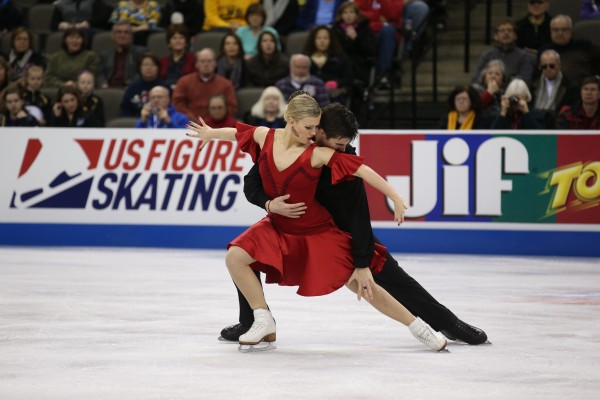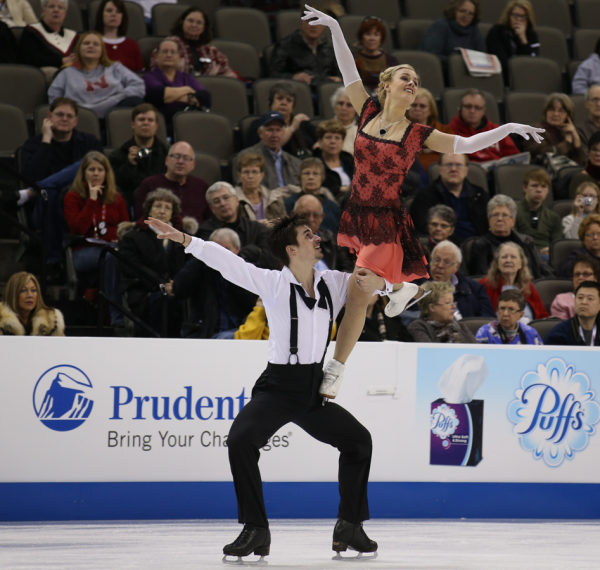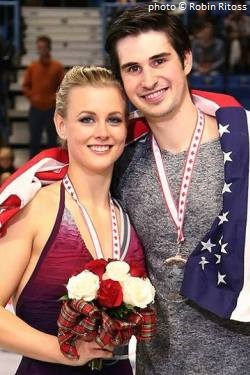Connecticut Skater Seeks Olympic Chance At U.S. Championships in Boston
/
Timing, as they say, is everything. For Olympic hopeful Zachary Donohue of Madison, Connecticut, and his skating partner Madison Hubbell of Michigan, a lifetime of training, determination, resiliency and competition will be in full view at the U.S. Figure Skating Championships in Boston this week.
As U.S. national bronze medalists in 2012, and fourth place finishers at the 2013 U.S. Championships, the ice dance couple is at the cusp. Three couples will earn U.S. Olympic team slots, to be announced on Sunday. The contest for those positions is expected to be extremely close.
For Donohue, it has been a long and winding road from New Haven and Madison, where he grew up, through New Jersey, Colorado, and Michigan where he trained and lived beginning at age 15, to the U.S. Championships in an Olympic year, just days after his 23rd birthday.
The journey began while visiting cousins in North Carolina, who took him along to go skating at a local spot. “I was just messing around, imitating what they were doing. One of my cousins said, “hey, you’re pretty good.” Unbeknownst to 10-year-old Zach, his athletic ability on blades was mentioned to his mom, who promptly signed him up for a “Learn to Skate” program when they returned home to New Haven. He excelled, and skating soon evolved from a “cool outlet for all my energy” to a more serious interest.
Then at age 13, he grew a foot and a half in a year, and had to reduce his ice time to let his body catch up to itself. The bones were outpacing the mu scles, which made jumps and spins painful. It was during that time that his love of music and interest in skating merged toward ice dance.
scles, which made jumps and spins painful. It was during that time that his love of music and interest in skating merged toward ice dance.
Now 6’2”, 195, Donohue is “tall, long and strong” – all attributes for a powerful yet graceful ice dancer. Madison “Madi” Hubbell, at 5’8” is taller than many ice dance partners, and together they bring and impressive line to their skating. The word most associated with their performances is “connection. “ They convey an emotional bond on the ice that is mesmerizing –earning the effusive admiration of commentators describing the fluidity, artistry and technical precision reflected in their routines.
In addition to training seven-days-a-week at the Detroit Skating Club, Donohue coaches skaters in nearby Troy, from 7 year-olds to young adults. His coaching focuses on everything but dance, an understandable change of pace. Through the years, he has discovered that he not only enjoys coaching, but choreography as well. That is not only helpful with his students, but in developing the championship-caliber routines of Hubbell & Donohue.
Perseverance Through Injuries
It has been a stunningly successful and incredibly challenging, injury-riddled year. Hubbell, out for two months recuperating from a concussion during which doctors precluded her from any exercise whatsoever, fought back and they not only competed effectively but won the coveted 2013 Nebelhorn Trophy in Oberstdorf, Germany, exceeding their personal best scores. No small task in the best of circumstances; remarkable given the realities. They had won the same competition two years ago, in their debut season together.
Barely back on the ice, and with pressure-packed competition as skating’s Grand Prix season intensifying, Hubbell has bravely forged through the current season despite a diagnosis of a labral tear, a hip-injury not uncommon in the sport, but incredibly painful, and at times, debilitating. She has been forthright about the injury, describing the challenges and limitations on their blog, while remaining upbeat and positive. And despite it all, they won their first-ever Grand Prix medal, and finished fourth at Skate America.
“They just focus, and they’re so supportive of each other. It is the persistence of an athlete – I’ve worked so hard for this, I’m just not gonna stop. They both have that,” observes Diane “Dee” Eggert, Donohue’s mother and biggest fan. Their recent success, in the midst of trying times, comes built on a foundation of trust and confidence that is “essential to any partnership,” Donohue points out. “Although still a relatively new team, just three years together, it was evident relatively quickly that “all the pieces fell into place” when they got together. “It takes time to get the kinks out,” Donohue says, but “we have become that well-oiled machine, through a tremendous amount of hard work.” Hubbell’s determination working through injuries has impressed not only Donohue, but the skating community.
It is an on-ice partnership that was unplanned, but clicked immediately. Hubbell had skated with her brother at the lower rungs of the skating ladder, and excelled, winning championships and much notice. When he opted to retire from skating, Donohue was simultaneously ending a previous partnership, which also had brought success. They found themselves on the same Detroit rink, at the same time, in need of new partners, and a coach off-handedly suggested they help each other out that day by working together. Hubbell and Donohue haven’t looked back.
Local Roads to National Acclaim
Donohue easily recalls time spent training and practicing at rinks in Cromwell, Newington and Simsbury, as his interest in and dedication to the sport grew. It was his mom who drove endlessly through central Connecticut to get him to training sessions, coaches, and practice time. “She’s always been by my side,” Donohue points out, appreciatively. “Skating puts a lot of stress on parents.” For those of modest means, especially so.
Employed by the security department at Yale University for nearly 15 years after a career in law enforcement, she added an extra job or  two along the way to help meet the relentless expenses of a skating career. She worked the overnight shift, so days could be spent with her son. Because of his skating-centric life, Donohue was home-schooled through his teenage years, and college plans remain on hold for now.
two along the way to help meet the relentless expenses of a skating career. She worked the overnight shift, so days could be spent with her son. Because of his skating-centric life, Donohue was home-schooled through his teenage years, and college plans remain on hold for now.
Beyond the ever-present skating, he has interests – and talent - in music and culinary arts, in addition to coaching and choreography. When Zach was 12 years old, he was selected as the singer to open a show at the Shubert Theater in New Haven, and his mom marveled at his ability to sing in front of an audience of nearly 500 people. Entertaining crowds has always been something he’s comfortable with. “He’s my cheering section, and I’m his cheering section,” she says proudly, recalling his growing success and relentless tenacity.
At every turn, she concluded “how can I stand in the way of his whole career,” as he proceeded to pursue the next step in the dream. She recalls vividly when she once broached the subject of giving up skating, as a youngster. “Well, there was just no way. He said he’d run away from home, sleep on the ice, and drive the Zamboni if he had to. That’s when I knew how much skating meant to him.”
At 15, he moved to New Jersey where he lived in his coach’s home and trained during the week, returning to Connecticut on weekends. By 17, he was moving to Colorado to work with a new coach as his development and advancement continued. While there, he had an opportunity to work with ice dance legend Christopher Dean, among his icons in the sport.
“It’s a sacrifice you make,” Eggert says, reminiscing about the Christmases, Thanksgivings and other holidays where Zach hasn’t quite been able to make it home. Donohue’s mom and Hubbell’s mom talk regularly, provide support and encouragement as needed, and look ahead. Whether or not they are selected for the Olympic team, other goals beckon, including the World Championships later this Spring, and noteworthy competitions thereafter.
“There are day s it’s hard but then you get to the competition and you realize it’s all worth it,” said Donohue. “There’s never a day I don’t love it. I love being on the ice.”
s it’s hard but then you get to the competition and you realize it’s all worth it,” said Donohue. “There’s never a day I don’t love it. I love being on the ice.”
Artistry and Athleticism
The music for their Short Program, to be skated on Friday, will be a “Big Bad Voodoo Daddy,” medley featuring the quickstep, foxtrot, and Charleston. For the free dance (long program) the next day, “Nocturne into Bohemian Rhapsody.” The music has been well received by audiences this year, and Donohue is pleased with his role assisting in the choreography. “I’m stubborn and outspoken,” and thereby earns a say in choreography decisions.
“He and Madi both feel the music. It’s a gift. Even when he was young, when he was practicing and someone else’s music would start, he’d skate away to the music. It’s been that way since day one,” Eggert recalled.
Four years ago, Donohue was in juniors, with a different partner on the ice. Today, he is on the brink of the Olympic dream becoming reality. What will fans see in Boston? A “better-than-ever version” of performances that earned top honors in Germany, even as extremely talented American teams vie for coveted Olympic slots.
“We’ve been working on our lifts and elements, and becoming stronger, faster and lighter.” Donohue admits to some nervousness prior to skating competitions, but that is quickly eclipsed by confidence as the music begins. The training regimen, from intense cardio to a relentless series of physically demanding exercises, is unending but essential. Injuries have required adjustments, but no stoppage.
The contrasts in skating can take your breath away. The unique combination of artistry and athleticism makes it a singular sport - also unique in that a man and woman are paired in competition.
Not to get ahead of the story, but the 2014 Olympics will have an attractive new feature – the first-ever figure skating team event, similar to the team competition in gymnastics. That will provide Olympic skaters with an opportunity to medal not only in individual events, but as part of a team – and Team USA is expected to be very much in the running. If all goes wonderfully in Boston, Madi and Zach – described by his mom as “two peas in a pod” - will be, too.






























